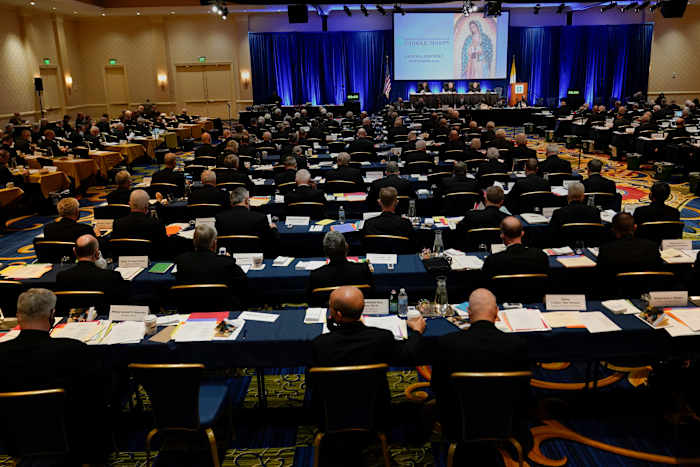Politics
US Catholic Bishops Set to Elect New Leaders Amid Divided Priorities

The United States Conference of Catholic Bishops will elect its next president and vice president on March 8, 2024, in Baltimore. This election serves as a crucial indicator of the bishops’ priorities, particularly in the context of their ongoing relationship with the Vatican and their stance on social issues, including immigration.
The selection of new leadership comes at a time when the bishops appear divided on various matters, reflecting broader societal tensions. Half of the ten candidates on the ballot represent the conservative wing of the conference, though the differences among them are often more stylistic than substantive. While the majority of U.S. Catholic bishops hold conservative views on social issues, some emphasize traditional stances on abortion and LGBTQ+ rights more than others.
According to David Gibson, director of Fordham University’s Center on Religion and Culture, “The slate of ten candidates perfectly reflects the dynamics of the American hierarchy in that it’s split down the middle.” Candidates were nominated by their peers, and the victor will succeed outgoing president Archbishop Timothy Broglio of the Military Services for a three-year term. Current vice president Archbishop William Lori of Baltimore is not eligible for the presidency due to being close to the mandatory retirement age of 75.
Among the conservative candidates, Archbishop Paul Coakley of Oklahoma City stands out as a formidable contender. He previously held the position of secretary of the conference and has connections to influential conservative groups, such as the Napa Institute. His past support for Italian Archbishop Carlo Maria Viganò, a critic of Pope Francis, is notable; Viganò was later excommunicated for his schismatic views.
Another prominent name is Bishop Robert Barron from the Winona-Rochester diocese in Minnesota. Known for his Word on Fire ministry, Barron has gained popularity as a Catholic media figure and serves on former President Donald Trump’s Religious Liberty Commission. He faces competition from Bishop Kevin Rhoades of Fort Wayne-South Bend, Indiana, who is also on the ballot.
Some Catholic insiders express hope for a leader who can unify the U.S. bishops and foster collaboration with the Vatican. Candidates such as Archbishop Charles Thompson of Indianapolis and Bishop Daniel Flores of Brownsville, Texas, could represent this bridge-building approach. As Latinos, Flores and another candidate, Archbishop Nelson Perez of Philadelphia, embody a growing demographic within the U.S. Catholic Church. Flores has taken a leading role in the Vatican’s synod process aimed at modernizing church practices.
Steven Millies, a professor of public theology at the Catholic Theological Union in Chicago, notes that “the two names that get talked about the most are Flores and Coakley.” He describes Flores as having an “ideologically unusual perspective,” given his traditional views on sexual ethics combined with his advocacy for migrants, particularly from his diocese along the U.S.-Mexico border.
The issue of immigration is expected to be a significant topic during the meeting. Although the bishops often express differing views on various subjects, they tend to unite in their support for migrants. The extent to which they will address the immigration policies enacted during the Trump administration remains uncertain.
Concerns surrounding immigration enforcement have contributed to declining Mass attendance in some parishes, as local clerics strive to provide sacraments to detained immigrants. The bishops have already ended their long-standing refugee resettlement program following the cessation of federal funding for aid by the Trump administration.
Pope Leo XIV has recently called for “deep reflection” on the treatment of migrants in detention, highlighting the profound impact on individuals who have resided in the U.S. for years without causing issues. He emphasized the need for compassion and understanding within the church concerning these vulnerable populations.
As the bishops prepare for this pivotal election, their choices will not only shape the direction of the U.S. Conference of Catholic Bishops but also reflect their response to pressing social issues, including immigration, that affect countless lives across the nation.
-

 Science4 weeks ago
Science4 weeks agoIROS 2025 to Showcase Cutting-Edge Robotics Innovations in China
-

 Lifestyle4 weeks ago
Lifestyle4 weeks agoStone Island’s Logo Worn by Extremists Sparks Brand Dilemma
-

 Politics4 weeks ago
Politics4 weeks agoJudge Considers Dismissal of Chelsea Housing Case Citing AI Flaws
-

 World4 weeks ago
World4 weeks agoBravo Company Veterans Honored with Bronze Medals After 56 Years
-

 Health4 weeks ago
Health4 weeks agoStartup Liberate Bio Secures $31 Million for Next-Gen Therapies
-

 Lifestyle4 weeks ago
Lifestyle4 weeks agoMary Morgan Jackson Crowned Little Miss National Peanut Festival 2025
-

 Science4 weeks ago
Science4 weeks agoArizona State University Transforms Programming Education Approach
-

 Health4 weeks ago
Health4 weeks agoTop Hyaluronic Acid Serums for Radiant Skin in 2025
-

 Top Stories4 weeks ago
Top Stories4 weeks agoUrgent Weather Update: Chicago Forecast for October 20 Revealed
-

 World4 weeks ago
World4 weeks agoHoneywell Predicts Record Demand for Business Jets Over Next Decade
-

 Sports4 weeks ago
Sports4 weeks agoYamamoto’s Mastery Leads Dodgers to 5-1 Victory in NLCS Game 2
-

 Top Stories4 weeks ago
Top Stories4 weeks agoIndonesia Suspends 27,000 Bank Accounts in Online Gambling Crackdown









